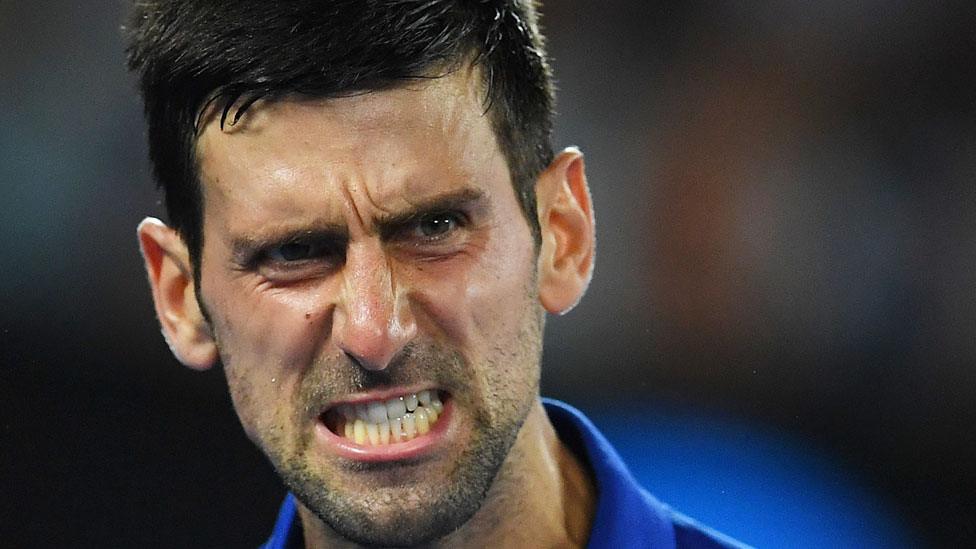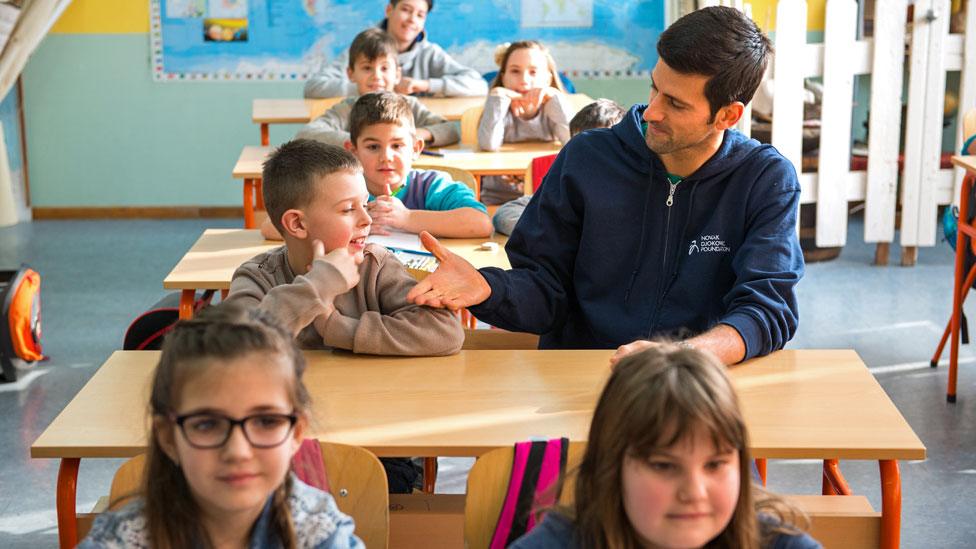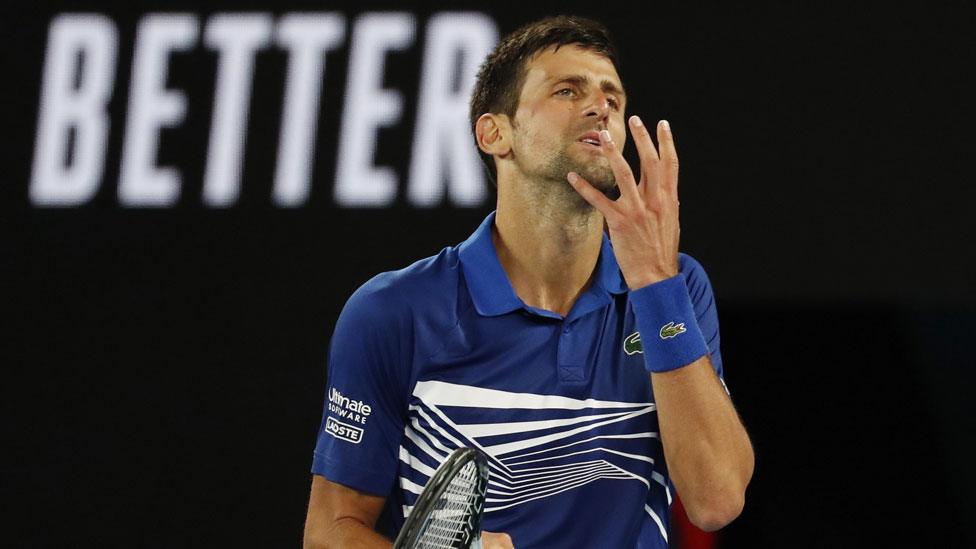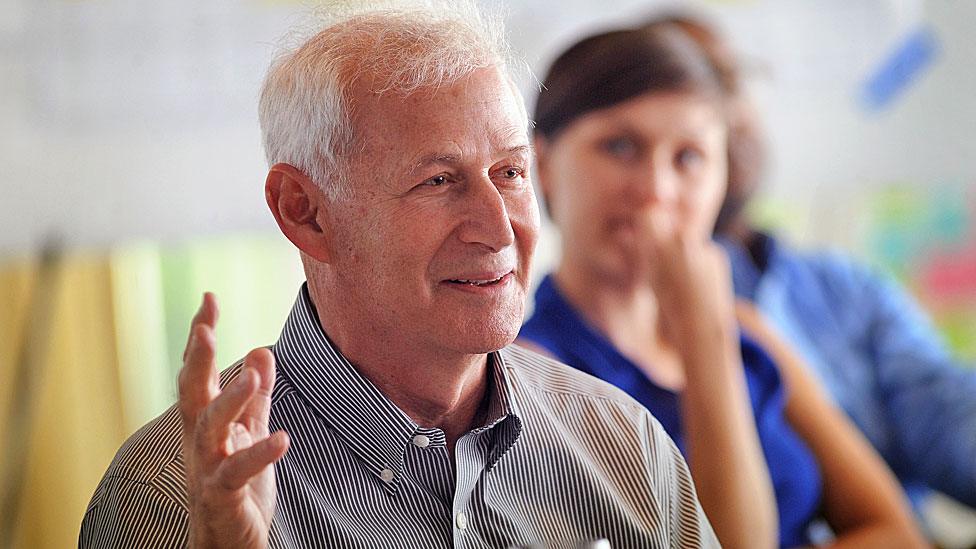Novak Djokovic's war memories make him fund childhood research
- Published

Novak Djokovic, competing in the Australian Open this week, is funding education researchers at Harvard
Novak Djokovic has been battling in the Australian Open this week.
But the tennis superstar has other goals that have nothing to do with sport, but much to do with his own childhood.
His foundation is funding four researchers per year at Harvard University to work on early years education.
Their research at the leading US university's Centre on the Developing Child is focused on ways to improve the lives of young children, often those facing poverty and violence.
This topic is personal to the world's number one tennis player because of his upbringing in Serbia during the Balkans war in the 1990s, after the break-up of the former Yugoslavia.
'Toxic environments'
"Growing up in a war-torn country is not easy on anyone, most of all the children," said Mr Djokovic.
"They don't have the coping mechanism as adults do and the impact of toxic environments on their life is tremendous.

Novak Djokovic is supporting projects investigating how to improve early years education
"Living with that kind of fear is detrimental for any child's development.
"And knowing personally how that feels, I promised myself years ago that if I could, I would do anything to help these children.
"I hope the research in this area will help minimise the trauma these children feel so that they too can grow up mentally strong and healthy individuals."
Building schools
The initial aim of the Novak Djokovic Foundation was to build pre-schools and support teacher training in Serbia.
But the partnership with Harvard began after a meeting in late 2015 between the foundation's chief executive Alberto Lidji and the research centre's director, Jack Shonkoff.

Mr Lidji describes Dr Shonkoff as "the Mick Jagger of early childhood development research".
"It was an area where we realised we could make a difference," said Mr Lidji.
"There are a lot of gaps within the body of knowledge on early childhood development and we realised that if we could deploy some of our resources to help to fill them, that would drive the field forward," he said.
The name recognition and fame of the tennis player helped to open doors, said Mr Lidji, connecting with "stakeholders who would otherwise not be engaged in early childhood development".
It was also not just a token involvement, said Mr Lidji, as despite the hectic international tennis circuit, Mr Djokovic has stayed closely involved with the foundation.
Earliest influences
Dr Shonkoff founded the Centre on the Developing Child in 2006, with the aim of learning how to intervene in children's early years to improve their life outcomes.
It was an area in which he thought there was a lack of investment and which was not taken seriously enough.

Jack Shonkoff says people are now recognising the far-reaching impact of early experiences
"People thought that because none of us can remember our experiences as babies, the early years don't matter much," he said.
But since then, a "revolution" in biology and neuroscience has changed that perception.
"We now know that what happens very early in life can have a lasting effect on lifelong outcomes on school performance and physical and mental health," he said.
"The early years have gone from being something which is seen as a responsibility of families to a public responsibility, because it's a return on investment that everyone benefits from."
Dr Shonkoff calls on governments to invest more in improving how they intervene early in children's lives.
Forced separation
"Many of the challenges ministers deal with, including economic productivity, skill building, physical and mental health, all have origins much earlier in life than school entry," he said.
As an example of the potential long-term impact, Dr Shonkoff highlights the separation of child refugees from their parents in the United States.
"Sudden, forcible separation of children from their parents is deeply traumatic for both," he said.
"Stated simply, each day we fail to return these children to their parents, we compound the harm and increase the lifelong consequences."
Dr Shonkoff emphasised the far-reaching importance of early experiences.
"If we focus more on the foundations of early learning, starting in infancy, we will get much better educational outcomes, have a better educated and more skilled population, and we will pay less for it," he said.
Novak Djokovic hopes the research work funded by his sporting triumphs will continue to improve the lives of young children long after he hangs up his tennis racket.

More from Global education
The editor of Global education is Sean Coughlan (sean.coughlan@bbc.co.uk).